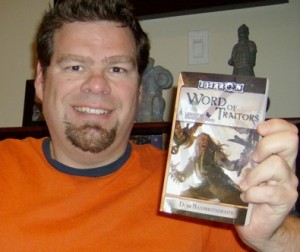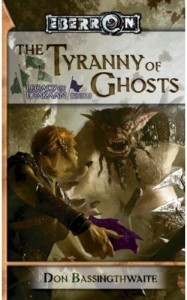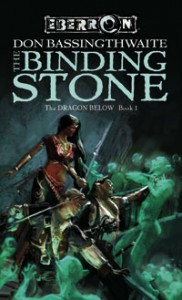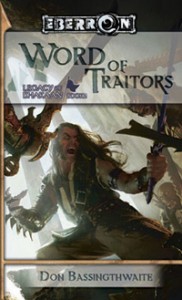
Today we complete our interview with Eberron author, Don Bassingthwaite. In this installment Don talks about The Tyranny of Ghosts, the third novel in the Legacy of Dhakaan trilogy, inventing the goblin language and who he would cast in the movie versions of his books.
Although the interview is presented in print and in multiple parts, we’ll make the complete interview available as an audio download in November’s Month in Review article.
You can read all about Don and follow him at his own website DBassingthwaite.com. You can also visit the Don Bassingthwaite page at Wizards of the Coast. It has a mini bio as wells as a list of the Forgotten Realms and Eberron books he’s written. They also provide sample chapters of his recent works for download.
If you missed the other installments, be sure to check out An Interview with Eberron author Don Bassingthwaite (Part 1) and (Part 2).
Interview – Part 3
When does The Tyranny of Ghosts, the third novel in the Legacy of Dhakaan trilogy come out?
It comes out in June 2010.
What can you tell us about it without giving away too many spoilers?
 Word of Traitors ended with some big changes and big events. A lot of The Tyranny of Ghosts (beyond wrapping up the trilogy) is the characters dealing with the consequences of what has happened, especially Geth. All of the characters have a little bit of something going on. I’ve set this up with Geth and I’ve set that up with Ekhaas the duur’kala, and resolving those was really a lot of enjoyment.
Word of Traitors ended with some big changes and big events. A lot of The Tyranny of Ghosts (beyond wrapping up the trilogy) is the characters dealing with the consequences of what has happened, especially Geth. All of the characters have a little bit of something going on. I’ve set this up with Geth and I’ve set that up with Ekhaas the duur’kala, and resolving those was really a lot of enjoyment.
One of the things is that a lot of Word of Traitors really took place in the city setting of Rhukaan Draal. A big part of The Tyranny of Ghosts is bringing the characters out of the city again, which was nice.
I learned some things when I was writing this trilogy about what I enjoy writing and maybe what I enjoy writing a little less and how things work. One of the things I found with Word of Traitors was that writing intrigue is really difficult to do well. Getting away from that with The Tyranny of Ghosts, for at least a bit (not all of it), was a lot of fun too. A lot of it was wrapping up the story. I’m trying to think of what else I can say without giving too much away.
Do you leave yourself with options should you want to continue telling the stories of some or all of these characters?
Yes. Yes I do. I mean for some of them I wrap up their story arc. Having written some of the characters for six books now it’s like “You know what? I’m fine leaving them in a place where I don’t have to tell another story about them.” I could, but there are other characters who it’s like, “Yeah, I would like to pick their story up and tell a little bit more about them.”
Going back to the Dragon Below trilogy, I would go back to Singe and Dandra. I could write a little bit more about them but I didn’t. They don’t appear in Legacy of Dhakaan. I may not write anything else about them, but I could if I wanted to.
If given the opportunity, are you interested in going back and writing about characters we already know in a time before the events we’ve already seen?
There are some of them that I would enjoy going back too. For example, Singe and Geth had a history before the events of The Binding Stone back during the Last War, and I think that would be a great story to write. So if I had the chance to go back and write Last War stories I think that would be a lot of fun, writing things in the past.
Do you envision this story as a short story in an anthology or perhaps as another trilogy?
I think if I was going to do something it would probably be a stand alone novel, especially because it’s difficult to sustain a story over three novels. And especially when you’ve got the future fixed. It’s hard to create a sense of danger when we already know that the characters survive. There are ways of getting around that. I can see maybe writing from the perspective of a third character during that time period. And then you don’t know exactly what’s going to happen to them.
 When I wrote The Binding Stone there were some names of characters from Singe and Geth’s mercenary unit that I threw out and I had it in my head that “Ok, this is who that character is,” very rough sketches. It would be fun to revisit that. But at the same time there are other stories where I don’t know if I’d ever write them.
When I wrote The Binding Stone there were some names of characters from Singe and Geth’s mercenary unit that I threw out and I had it in my head that “Ok, this is who that character is,” very rough sketches. It would be fun to revisit that. But at the same time there are other stories where I don’t know if I’d ever write them.
Geth, after he’s left the mercenary unit in disgrace has wandered for a period and he’s found this new home in the Eldeen Reaches. The hamlet of bull hallow with the druid Adolan. I don’t think I’d write stories set around that because it’s sort of a quiet period in Geth’s life. And I know in my head there’s nothing that really happens there. So maybe a short story would work but not too much. So it would be further back then that.
I’d write about Geth and Singe and other characters. I can’t remember how this came up but I realized most of my other character’s I can’t write a prequel for because they don’t exist. They live in isolation or they don’t exist. The character Dandra (here’s a spoiler for anyone who hasn’t read the Dragon Below trilogy) is a psicrystal. So she doesn’t really get around too much. There are limits. There are some stories I’d tell, some stories I wouldn’t.
There are some stories that come up in the new trilogy, Legacy of Dhakaan that I’d love to tell more about like the character Keraal, the disgraced warlord who becomes a hero. I’d love to write more about that. I would definitely like to write more stories about him. We’ll see. And the whole goblin arc, a military company that he becomes associated with, I always thought “Yeah, I could do more with them.” But we’ll see.
In your novels the goblin characters use a lot of goblin terms. How did those come about? Were you given a list or did you make it up as you went along?
I started it on my own. Doing the language
In the back of the novel The Binding Stone there’s a list of prefixes and suffixes. Was this provided by Wizards of the Coast or did you create it?
No, it’s mine. I did it. When I started writing it I went through the products I had and I looked for goblin words. I made up a master list of them. I consulted with Keith Baker a bit on this some of his words. And then I sort of followed that pattern and built things out of it. So most of it, I came up with on my own. Part of my anthropology background has a little linguistics component, so I have an idea of how it’s going to work.
What would a linguistics expert think if they read your book?
They would probably mock me for taking a very simplistic approach. But it’s not done willy-nilly. I try to maintain consistency. I try to keep the same sound patterns, the repeated vowels, which isn’t just a spelling thing, it’s an extended vowel sound. You can try to hear the language with it. But it also reflects concepts. It’s like some of it’s random and others this makes sense.
I decided goblins never say thank you. And I’ve caught myself. Usually when I finish the book I go back through and do a word search on “thank you” or “thanks” and any time a goblin says it I’m like “oh crap” and take that out. They’ve got a substitute word that’s an acknowledgment of an action but there’s no gratitude involved. Other things have just sort of come up.
There are no goblin plurals, as such. That was a weird one. It came out of duur’kala the dirge singers. Keith Baker sort of started it. Duur’kala seemed to be the same for singular or plural and so I copied that. There’s no difference in words between singular and plural anywhere in the goblin words.
But yeah, I just try to be consistent with it. As I make it up I keep the list. When I do similar grammatical things I make a note “Ok, this is how this is formed.” Guul is strong, guulan is strength. And I’ve got a couple of other similar things like that. It’s all in there. I just try to be consistent because that’s how it works best. It looks good. People can follow it and figure it out.
If they ever turned your book into a movie and you could pick anyone you wanted to play the main roles, who would you cast?
 Let’s start with Geth since he’s the main character. There are two that come to mind. One of them is Ray Park who did Darth Maul and he was Snake Eyes in G.I. Joe and Toad in the X-men movie. I picture Geth’s fighting style as a lot of sweeping motions and whirling partly because the sword he uses doesn’t have a point so I have to consider that in all the moves he makes. So there’s that for the visual appeal.
Let’s start with Geth since he’s the main character. There are two that come to mind. One of them is Ray Park who did Darth Maul and he was Snake Eyes in G.I. Joe and Toad in the X-men movie. I picture Geth’s fighting style as a lot of sweeping motions and whirling partly because the sword he uses doesn’t have a point so I have to consider that in all the moves he makes. So there’s that for the visual appeal.
And then there’s Liev Schreiber who was Sabretooth in the recent Wolverine movie. Visually that’s sort of what I picture him like. He’s got to be someone who looks fairly bulky and stalky and hairy, because Geth’s got a lot of hair and it would be difficult to picture some people with all that hair. Like Ryan Reynolds. No, I can’t picture him as Geth.
Female characters. I’ve tried to picture who would play Ashi, for example, and it’s a more difficult match because you want someone who plays a very strong fighter kind of role but has a sort of innocence. When Ashi is fighting she’s all about the fighting. But then you put her into a social situation with the dragonmarked houses and it’s something new and novel to her. She’s got to be able to play innocent too.
Kate Beckinsale is sort of standard. Eva Mendez kind of has the look but is a little short for the role. Physically the person who I think could carry it off is Rebecca Romijn. She did Mystique in the X-men movies, so she’s got that, but she’s got the size. I can sort of picture her.
They’re the ones I sort of think of. Some of the non-human characters, like Ekhaas the hobgoblin, is hard to say. Although I had the draft cover for Tyranny of Ghosts recently and it features Ekhaas on the cover and she looked a lot like Beyoncé. Unfortunately I had to say “Can we tune that back just a little bit.” You hate to say it, but she looked too pretty for the role. It was like “You’ve got to dial it back just a bit.” It would be Beyoncé under a lot of make-up, unfortunately.
Finally, what advice would you give to aspiring writers? Or anyone who wants to work for Wizards of the Coast?
They hold rare open calls and that is probably your best way to get in. Write something and put it before them. You’ve got to be a little bit persistent. Not too persistent. And keep at it.
Be respectful. “I’ve got something for you and I’d love to know if you think you’ve got an opening for me. I’d be willing to write this and write that.” You have to be flexible because they, or any company, are going to have people who are already working on a line and if you’re attached to that line you might not get it. But if you’re offered another line you should take it.
And don’t get too attached to your stories because chances are you’re not going to get to write what you want. At least not initially. Always do the best work you can. Hit your deadlines. Write well. And that’s pretty much it.
But if you can’t get into that write other stuff too. Write your short stories, write whatever. With the media tie-ins right now there are a lot of big name authors who are recognizing there’s money there, and they’re coming into it and they’ve made their name somewhere else. And the same thing applies for anybody. Make a name, do good quality work it gives you a stepping stone for writing whatever.
I’d like to once again thank Don for letting us interview him. If you haven’t already picked up Don’s laters novel, Word of Traitors, I stongly reccomend you put it on your Christmas list. It’s a great read.
 Looking for instant updates? Subscribe to the Dungeon’s Master feed!
Looking for instant updates? Subscribe to the Dungeon’s Master feed!
2 replies on “An Interview With Eberron Author Don Bassingthwaite (Part 3)”
[…] Dungeon’s Master next week when we continue our interview with Don Bassingthwaite in Part 2 and Part 3 of this series.. Share and […]
[…] We were fortunate enough to get an interview with Eberron author Don Bassingthwaite. He was very forthcoming about how he got his start writing D&D novels, how his work continues to impact the Eberron setting and even who he’d cast in movie versions of his books (Part 1 | Part 2 | Part 3). […]